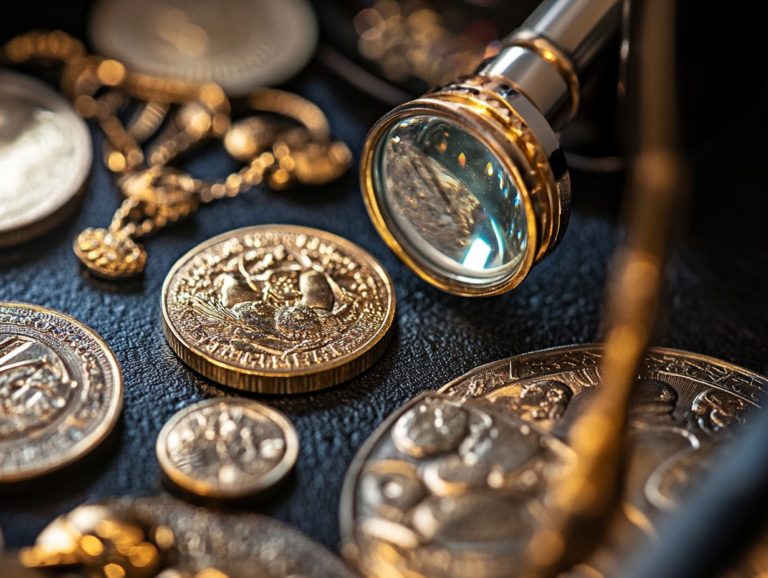5 Reasons to Buy Gold Coins Over Bullion
When you contemplate investing in gold, the decision between coins and bullion is pivotal. Gold coins present unique advantages, serving as tangible assets that can significantly enhance your portfolio. Now is the time to consider gold as a key part of your investment strategy!
From their ease of storage and transport to their often more affordable premiums, there are compelling reasons to lean toward coins. This article delves into five key benefits of selecting gold coins over bullion, offering insights on authenticity, tax implications, and effective selling strategies.
Explore the myriad reasons why gold coins could be a valuable addition to your investment journey.
Contents
- Key Takeaways:
- 1. Easier to Store and Transport
- 2. More Liquid and Easily Convertible
- 3. Lower Premiums and Markups
- 4. Better for Gifting and Collecting
- 5. Greater Variety and Design Options
- What Are Gold Coins and Bullion?
- Frequently Asked Questions
- What are the five reasons to buy gold coins over bullion?
- What makes gold coins more collectible than bullion?
- Why is liquidity important when considering gold coins?
- How do gold coins provide more security than bullion?
- What variety do gold coins offer that bullion does not?
- Are gold coins more affordable than bullion?
Key Takeaways:

Gold coins are easier to store and transport compared to bullion, making them a more convenient investment option.
Gold coins are more liquid and easily convertible, allowing for quicker access to cash if needed.
Gold coins typically have lower premiums and markups compared to bullion, making them a more cost-effective investment.
1. Easier to Store and Transport
Gold, often celebrated as a timeless asset, offers you unique advantages in terms of storage and transport, making it an essential component of any investment portfolio aimed at hedging against inflation and economic uncertainty.
From ancient civilizations like Lydia, where King Croesus first showcased gold for its intrinsic value, to today, it remains a favored choice for those seeking to preserve and protect their wealth. Its compact form and high value per weight render gold significantly easier to store compared to bulkier investments like real estate or commodities.
Unlike stocks, which can be vulnerable to digital mishaps, or bond certificates that require meticulous record-keeping, gold can be physically held, providing a comforting sense of security during turbulent times. You ll appreciate that, unlike most other assets, gold maintains its liquidity, allowing for quick conversions into cash especially advantageous when market volatility rears its head.
This unique combination of portability and inherent value reinforces gold’s stature as a stable asset in ever-fluctuating economic landscapes.
2. More Liquid and Easily Convertible
Gold is one of the fastest and most convenient assets to convert into cash, thereby preserving your purchasing power during periods of economic uncertainty. This liquidity means you can easily exchange gold for cash or other currencies, reinforcing its status as a valuable asset for wealth preservation.
Various markets be it local dealers, online platforms, or international exchanges offer a plethora of opportunities for selling gold coins and bars. You ll find the process refreshingly straightforward; often, you can receive instant quotes or offers, ensuring you have timely access to your funds.
Unlike many other investments that might burden you with lengthy procedures or diminished returns when selling, liquidating gold remains efficient and uncomplicated.
3. Lower Premiums and Markups
When you invest in gold, especially in forms like coins and bullion, you ll often notice lower premiums and markups, which can significantly enhance your overall investment strategy.
This happens for a few reasons, including production costs related to extracting and refining gold, as well as the purity levels of the metal. Lower production costs allow dealers to offer more competitive pricing, directly impacting the premiums you encounter.
Gold items of higher purity typically have less markup since they re easier to liquidate and more widely accepted in the market. Understanding these factors helps you make better choices and increases your returns, enabling you to maximize your profits by choosing gold options with favorable cost structures.
4. Better for Gifting and Collecting

Gold stands out as an exceptional choice for both gifting and collecting. Its real value and aesthetic charm make it a prized possession that can be treasured across generations.
Gifting gold has cultural importance in various traditions worldwide, symbolizing prosperity, love, and lasting connections.
In many cultures, jewel-encrusted gold coins or collectible items are valued not only for their monetary worth but also for their sentimental significance. They often mark important life milestones like weddings, birthdays, or anniversaries.
There’s a growing buzz around collecting rare gold coins that every enthusiast should know about! Recent trends reveal a burgeoning interest in limited editions, captivating both passionate collectors and savvy investors.
This combination of emotional significance and potential financial growth transforms gold into more than just a gift; it becomes a legacy, preserving cherished memories and wealth for future generations.
5. Greater Variety and Design Options
Investing in gold offers you an impressive range of design options, whether you prefer coins or bullion. This allows for personal expression while aligning with market trends.
Imagine owning intricately designed sovereign coins adorned with national symbols or limited-edition pieces crafted by celebrated artists. The diversity in gold designs reflects the rich tapestry of various cultures.
Each piece tells a unique story, showcasing the artistic heritage and history that make it special. This variety is especially enticing for collectors seeking specific editions or motifs, as well as for investors drawn to designs with promising market potential.
The blend of aesthetic appeal and investment value transforms gold into a versatile asset, catering to a wide range of personal tastes and financial strategies.
What Are Gold Coins and Bullion?
Gold coins and bullion represent two fundamental avenues for gold investment. Each has its own distinct characteristics and advantages, offering options tailored to your strategies for wealth preservation and protection against economic fluctuations.
These tangible assets have historical significance, serving as currency and symbols of wealth. They also hold real value due to their composition of precious metals.
You might find yourself drawn to gold coins for their artistry and collector s allure. Iconic examples like the American Gold Eagle and the Canadian Maple Leaf capture attention.
On the other hand, bullion usually refers to gold bars or ingots ideal for those seeking a straightforward return on investment.
Both forms act as effective hedges against inflation, safeguarding your wealth when currency values decline. Ultimately, they provide you with a reliable means to bolster your financial stability.
What Factors Should Be Considered When Choosing Between Gold Coins and Bullion?
When weighing the merits of investing in gold coins versus bullion, several critical factors come into play: liquidity, premiums, and your personal preferences regarding design and collectible value. Additionally, you might want to explore reasons to consider platinum investments as part of your overall strategy.
First, consider liquidity; it s crucial for how easily you can convert your assets back to cash. Generally, bullion offers higher liquidity due to its standardized weight and purity, making it simpler to sell when the time comes.
Gold coins attract collectors due to their unique designs, but their resale value can be more unpredictable, depending on market demand and rarity. Don’t overlook premiums, as they significantly impact your overall investment returns.
Coins often come with higher premiums due to their features that make them collectible, while bullion typically has lower premiums that align more closely with the market price of gold.
And let’s not forget personal preference some may be captivated by the aesthetic charm and historical significance of coins, while others might lean toward the straightforward appeal of bullion.
By considering these factors, you ll be well-equipped to make informed decisions that align with your financial aspirations.
What Are the Potential Risks of Investing in Gold Coins?

Investing in gold coins comes with potential risks that you need to navigate carefully. These include market volatility, authenticity concerns, and challenges associated with selling. All of these factors are crucial for safeguarding your portfolio.
Market fluctuations can lead to sudden drops in gold’s value, creating uncertainty for anyone holding these assets. Additionally, the prevalence of counterfeit coins poses a significant challenge; you might unknowingly purchase fakes, resulting in considerable financial loss.
Selling gold coins isn t easy; it often demands proper documentation and the effort to find reputable buyers. Gather the necessary paperwork and ensure your coins are in excellent condition to streamline the process.
To mitigate these risks, conduct thorough research on the coins you plan to invest in. Consider purchasing from established dealers and maintain comprehensive records. This way, you’ll have all the necessary information at your fingertips when it s time to sell.
How Can One Determine the Authenticity of Gold Coins?
Determining the authenticity of gold coins is essential for you as an investor. You can achieve this through reliable methods like professional grading services such as PCGS and NGC, as well as personal verification techniques.
Ensuring the gold you acquire is genuine protects your financial investment and bolsters your overall trust in the transaction. Examine the certifications that accompany each piece, confirming they meet industry standards for quality and authenticity.
Checking the purity of the gold, measured in karats (a measure of gold purity, where more karats mean purer gold) or fineness, can provide you with additional peace of mind. By utilizing trusted grading services, you add an extra layer of confidence to your investments.
These organizations are recognized for their expertise in evaluating the quality and legitimacy of precious metals, enabling you to make informed decisions every step of the way.
What Are the Tax Implications of Buying Gold Coins and Bullion?
Understanding the tax implications of buying gold coins and bullion is essential for you as an investor, as it can significantly influence your investment strategy and potential taxes on profit when you sell.
Beyond the intrinsic value of these precious metals, the varying tax treatments across different jurisdictions introduce complexities that you must navigate to be a savvy investor.
For example, certain regions may impose higher taxes on gold, classifying it as a collectible, while others might offer more favorable rates akin to those for stocks or bonds.
Additionally, reporting requirements can vary widely; some localities demand detailed disclosures that require your careful attention to ensure compliance.
Being aware of these factors enables you to make informed decisions that align with your financial goals and help mitigate unexpected tax liabilities.
How Can One Sell Gold Coins and Bullion?
Selling gold coins and bullion can be a seamless experience, especially when you grasp the market demand and key factors affecting liquidity and pricing. Start by identifying the appropriate market for these valuable assets.
This means diving into research to find reputable dealers, whether they re local gems or online powerhouses, who offer competitive rates. Stay on top of current gold prices to maximize your profit, as these fluctuations can significantly impact your selling price.
Understanding the market landscape will enable you to time your sale effectively. With the right preparation and knowledge, you can approach the transaction with confidence, ensuring you secure a fair deal.
Watch this video to learn more about investing in gold coins and bullion.
Frequently Asked Questions

What are the five reasons to buy gold coins over bullion?
The five main reasons to buy gold coins over bullion are: collectibility, liquidity, security, variety, and affordability. To learn more about investing wisely, check out these smart tips for buying gold bullion.
What makes gold coins more collectible than bullion?
Gold coins often have unique designs and limited mintages, making them more desirable to collectors. Bullion, on the other hand, typically has a standard design and higher mintages.
Why is liquidity important when considering gold coins?
Gold coins are easier to buy and sell than bullion. Their popularity among collectors and investors contributes to their liquidity.
How do gold coins provide more security than bullion?
Gold coins are verified by authorities, which helps prevent counterfeiting. In contrast, bullion can be more easily forged.
What variety do gold coins offer that bullion does not?
Gold coins come in a wide range of designs, sizes, and weights. This variety gives investors and collectors more options than standard bullion.
Are gold coins more affordable than bullion?
Gold coins are often a budget-friendly choice due to their smaller sizes. This allows for flexibility in purchasing and selling smaller amounts of gold.





